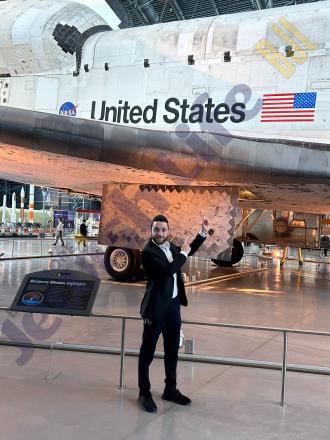Newark, NJ - Nearly 11 years after he was publicly censured by a group of rabbis who also cancelled what would have likely been a groundbreaking Madison Square Garden concert, entertainer Lipa Schmeltzer made peace with one of the leaders of the movement to denounce him after an encounter on a flight to Israel.
Schmeltzer was waiting at Newark Liberty Airport to check in for his El Al flight to Israel this afternoon on his way to a performance when he saw Rabbi Yosef Yisroel Eisenberger, the Skvere Dayan, standing in line for the same flight. Izzy Bleier, a friend of Schmeltzer’s, said that he could see that the entertainer was visibly shaken.
“I asked him what was going on and he told me that he was seeing someone he didn’t want to meet,” Bleier told VIN News.
Schmeltzer pointed Rabbi Eisenberger out to Bleier, explaining that he had been the driving force behind the concert ban and other difficulties that ultimately led to his leaving New Square.
“I told him to walk away, not to look at him and to just move on,” said Bleier.
But midway through the flight, Schmeltzer found himself face to face with Rabbi Eisenberger when the two found themselves as part of the same group praying Maariv together.
Schmeltzer said that Rabbi Eisenberger greeted him warmly, returning those words with a smile of his own. Mulling over the encounter as he prayed, Schmeltzer decided that the time had come to let go of the resentment that he had been carrying for over a decade.
The timing couldn’t have been more appropriate, noted Schmeltzer, who observed that the encounter was taking place on Purim Katan, a day noted for its spiritual power, as well as on the anniversary of the death of his grandfather who died during World War II.
“It was a good time,” said Schmeltzer, in an interview with VIN News while still airborne. “I said Kaddish for my grandfather who is buried in a mass grave and I knew that my father wanted so much for me to return to Skver. I don’t know if I am ready for that yet, but meeting the Dayan on Purim Katan and on my grandfather’s yarhtzeit, it has to be a sign and I decided the time had come to make peace.”
Schmeltzer asked for a private conversation with Rabbi Eisenberger, who acceded to his request.
“I told him about the difficulties I have gone through and he quoted a biblical verse to me about letting it all go into the ocean,” said Schmeltzer. “He said to me, ‘Lipa, I forgive you and I want you to forgive me.’ I wanted to hear it again, and he repeated his words. I told him 100 percent, I am moving on.”
The ban in 2008
Schmeltzer said that before leaving Rabbi Eisenberger he asked for the opportunity to learn a mishna in memory of his grandfather, also departing with a blessing for his success inspiring the world in a positive and meaningful way. In a more lighthearted moment, Schmeltzer said that the Dayan asked him if he was saying Kaddish for his father who passed away some time ago.
“I explained that it was my grandfather’s yahrtzeit and as a joke said that some people who missed saying Kaddish during the year of mourning have to say extra when their year is finished and he was laughing,” joked Schmeltzer.
Schmeltzer moved out of New Square years ago, settling in Airmont where he had his own synagogue that welcomed Jews of all stripes. He graduated last June from Columbia University with a dual major in creative writing and visual arts, having worked his way up the educational ladder from the very first rung by taking equivalency courses in order to gain admission to Rockland Community College, where he earned an associate degree.
In recent months he has begun reconnecting his ties with the Chasidic community and reinvigorating his singing career with public appearances and an upcoming CD, adding to the more than 20 albums he has already released.
Having developed a passion for art, Schmeltzer has been creating paintings and sculptures often based on Jewish songs, rhythms and gimatriyas, numerical representations of words, often combining music and art when he works with elderly residents at local Jewish nursing homes.
Buoyed by letting go of negativity that has accompanied him for so many years, Schmeltzer said that the meeting was extremely powerful and meaningful to him.
“I have been dragging this baggage for close to 20 years,” said Schmeltzer. “There has been so much pain and now I let everything go into the ocean below me.”




















